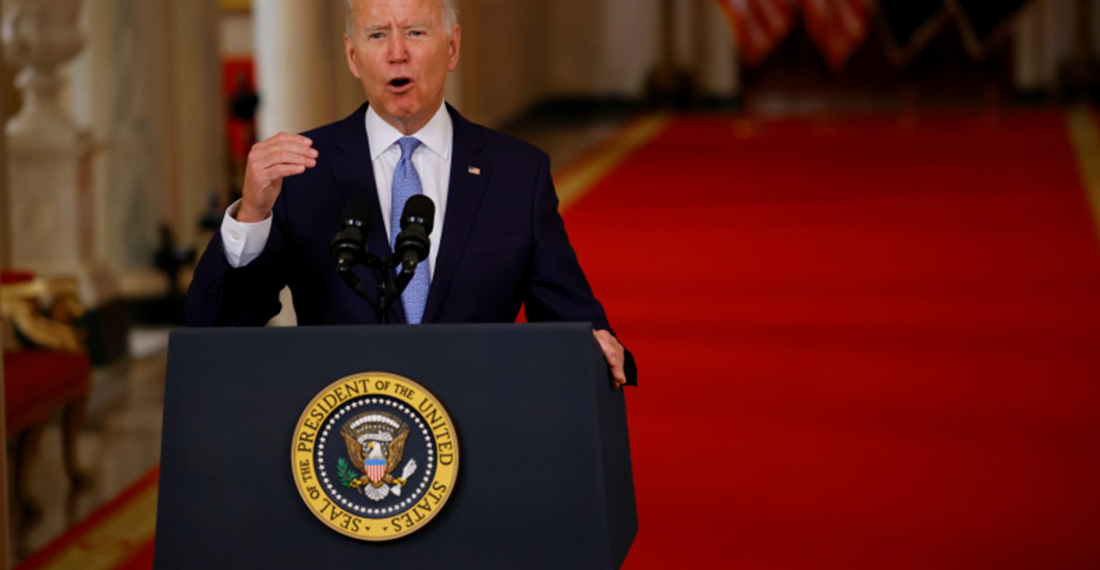US president Joe Biden on Tuesday (31 August) officially declared the two-decade war in Afghanistan over. In a televised broadcast Biden said the world is changing, and the time of American engagement with nation-building was over, and that the US must now focus on the threats of the 21st century, including Russia and China.
“We’re engaged in a serious competition with China. We’re dealing with the challenges on multiple fronts with Russia. We’re confronted with cyberattacks, and nuclear proliferation. We have to shore up America’s competitiveness to meet these new challenges in the competition for the 21st century. We can do both: fight terrorism and take on new threats that are here now, and will continue to be here in the future. And there’s nothing China or Russia would rather have, would want more in this competition than the United States to be bogged down another decade in Afghanistan.”
Biden said the US must learn from its mistakes:
“As we turn the page on the foreign policy that has guided our nation the last two decades, we’ve got to learn from our mistakes. To me, there are two that are paramount. First, we must set missions with clear achievable goals, not ones we’ll never reach. And second, we must stay clearly focused on the fundamental national security interests of the United States of America.
“This decision about Afghanistan is not just about Afghanistan. It’s about ending an era of major military operations to remake other countries. We saw a mission of counterterrorism in Afghanistan – getting the terrorists and stopping attacks – morph into a counterinsurgency, nation-building, trying to create a democratic, cohesive and united Afghanistan. That’s something that has never been done over many centuries of Afghans’ history. Moving on from that mindset and those kind of large-scale troop deployments will make us stronger and more effective and safer at home.
“And for anyone who gets the wrong idea, let me say clearly: to those who wish America harm, to those who engage in terrorism against us or our allies, know this: the United States will never rest. We will not forgive; we will not forget. We will hunt you down to the ends of the Earth and you will pay the ultimate price.
“Let me be clear. We will continue to support the Afghan people through diplomacy, international influence and humanitarian aid. We’ll continue to push for regional diplomacy engagement to prevent violence and instability. We’ll continue to speak out for the basic rights of Afghan people, especially women and girls, as we speak out for women and girls all around the globe.
“I’ve been clear that human rights will be the centre of our foreign policy. But the way to do that is not through endless military deployments, but through diplomacy, economic tools and rallying the rest of the world for support.”
Biden declared the twenty year war in Afghanistan over:
“My fellow Americans, the war in Afghanistan is now over. I’m the fourth president who has faced the issue of whether and when to end this war.
“When I was running for president, I made a commitment to the American people that I would end this war. Today, I’ve honoured that commitment. It was time to be honest with the American people again.
“We no longer had a clear purpose in an open-ended mission in Afghanistan. After 20 years of war in Afghanistan, I refuse to send another generation of America’s sons and daughters to fight a war that should have ended long ago.”
As a final thought, President Biden also reminded the American people of the financial cost of the Afghan war, lamenting the opportunities lost from having not spent two trillion dollars in other ways:
“After more than $2 trillion spent Afghanistan, the costs the researchers of Brown University estimated to be over $300m a day for 20 years in Afghanistan, for two decades. Yes, the American people should hear this: $300m a day for two decades. You take the number of one trillion, as many say. That’s still $150m a day for two decades. What have we lost as a consequence in terms of opportunities?”







